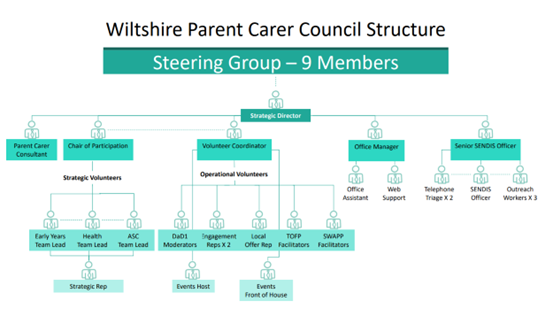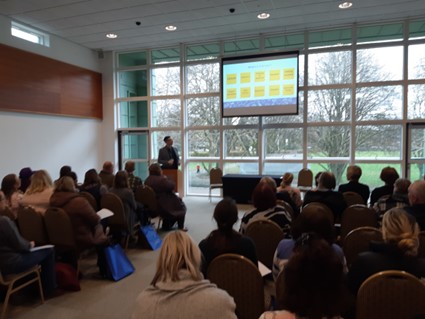Wiltshire Parent Carer Council (WPCC) was established in 2008 as a voluntary group led by parents and carers of children and young people with additional and special educational needs and disabilities (SEND). Wiltshire is a mainly rural county, but the WPCC has achieved a unique reach by reducing barriers to membership. It’s currently made up of over 4000 active members who share their thoughts about the services they access.
The challenge
In 2023, a record half a million pupils had an education health and care plan in England - a figure that’s more than doubled since 2015. Given this increase, a key challenge for WPCC is having enough capacity to meet the rising demand, and engaging with as many parents and carers as they can to ensure they are a truly representative forum.
The solution
Prior to the reforms in 2013, the WPCC sought and secured additional funding from the local authority to enable the parent carer forum to employ two information officers. Named locally as SENDIS, this service launched prior to the SEND reforms and was in direct response to parent carer feedback identifying a need for dedicated and specialist support and signposting. Additional funding from the local authority has over the years ensured that the WPCC’s support and signposting offer can grow, which has enabled the parent carer forum to enhance and build on its early offer. WPCC currently employs two telephone triage workers who signpost parents at the initial point of contact if enquiries are low level and two telephone information officers who support parents and carers with more complex enquiries. WPCC’s information and signposting offer is further enhanced by their three outreach workers who go into the community to provide information and support for harder to reach and more vulnerable parent carers, in an effort to reduce barriers and promote inclusion.
This diagram shows the structure of the Wiltshire Parent Carer Council. Lead by a strategic director, the rest of the steering group is made up of a parent carer consultant, chair of participation, volunteer coordinator, office manager and senior SENDIS officer.
The chair of participation oversees the work of a group of Strategic Volunteers: an early years team lead, health team lead, ASC team lead and a strategic representative. The volunteer coordinator lead’s a team of operational volunteers, including: DaD1 moderators, two engagement representatives, a local offer representative. TOFP facilitators, SWAPP facilitators, an events host and an events front-of house.
The senior SENDIS officer is supported by two telephone triage officers, a SENDIS officer and three outreach workers. Whilst the office manager’s team includes an office assistant and web support officer.
Where website and phone calls prove a challenge, outreach workers make home visits. This is especially helpful when parent carers have a disability themselves, have limited access to technology, speak English as a second language, have low confidence, or live with a mental illness. WPCC is extending reach to seldom heard families, so that their voice is just as heard and included in WPCC’s work. Services delivered by the WPCC place engagement at the heart of the local offer and provide a one-stop shop for families of children and young people with SEND. Through their proactive efforts, they are able to reach a significant number of children and young people with SEND to ensure they are connected with the services they can access.
Recent funding has also supported a paid volunteer coordinator to lead the WPCC engagement team and work with settings (early years, schools and coffee mornings) to promote the parent carer forum and help to engage more parent carer members. The volunteer coordinator also supports and coordinates a large number of other WPCC volunteers including those delivering parenting courses and supporting the QA element of SEN decision-making groups. Large in-person information events are hosted at least twice a year, with over 200 members in attendance at each event. These events are free to attend, and the WPCC offers tea, coffee and cake to all who attend, as well as covering travel and childcare expenses for parent carer attendees.
Wiltshire has a large military population and these families are not always proactive about seeking support, yet the WPCC has been successful in engaging them due to their position as a non-statutory body and working closely with the Army Welfare Service so that military families are aware of the support available to them.
The impact
By November 2023, WPCC’s membership approached 5,000, it is one of the largest parent carer forums in the country, vastly exceeding the average forum membership of 600 members. On average, five new families are registered as WPCC members every week. A membership audit is conducted annually to ensure that membership figures are accurate; approximately 80 per cent of families with a young person over 25 opt to stay in the forum as they still find information useful.
A weekly newsletter is sent out to parent carers by the WPCC, disseminating local, regional and national SEND information. Over 300 professional partners are also in receipt of a ‘Professionals’ copy of this newsletter and they cascade it to their teams to be shared with the families they work with. For those unable to access digital content, postal copies of the WPCC newsletter are posted to approximately 39 of Wiltshire’s families.
The WPCC maintains a strong and positive relationship with Wiltshire council alongside their independence. This allows the WPCC to embed a representative voice into commissioning services which includes delivery, design and improvement. Specific examples include parent and carers sitting on local authority SEN decision making groups as observers, involvement in revising SEN panels and parent representatives being involved in contract tender processes. Designed in partnership with parents and carers, information about the Wiltshire Short Breaks Scheme and support to apply can be accessed through the WPCC.
How is the new approach being sustained?
In order to maintain the person-centred approach, the WPCC works creatively to support parent carers to navigate the SEND space to make a real difference to the lived experience of children, young people and their families. The WPCC reassures that they’re not a onetime offer, instead parents and carers can reach out whenever they are in need of support.
Lessons learned
The WPCC prides itself on never saying ‘can’t’ and takes a personalised approach, ensuring that they always try to best meet the needs of families and invest time to speak to families; it is not unusual for one of the WPCC information officers to spend an hour or more on the telephone with a parent carer.
Realistic funding is essential to providing the WPCC’s enhanced support offer. Without which, many of the WPCC’s staff could not be employed and there would be a significant and detrimental impact on the capacity on parent carers, access to early information and support, and a knock-on effect on the wider SEND system. The WPCC team is made up of SEND experienced parents and carers who use their knowledge, lived experience and empathy to give the WPCC real credibility for families. The WPCC operates professionally as an independent and impartial organisation which informs the local strategic SEND landscape and this gives the WPCC credibility for local area partners.
Contact
Contact person for the project
Stuart Hall, Strategic Director
Email: [email protected]


